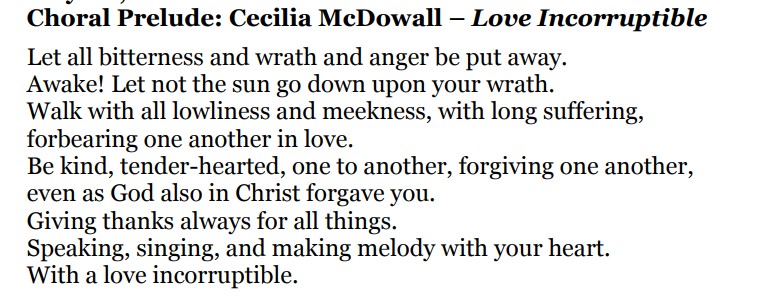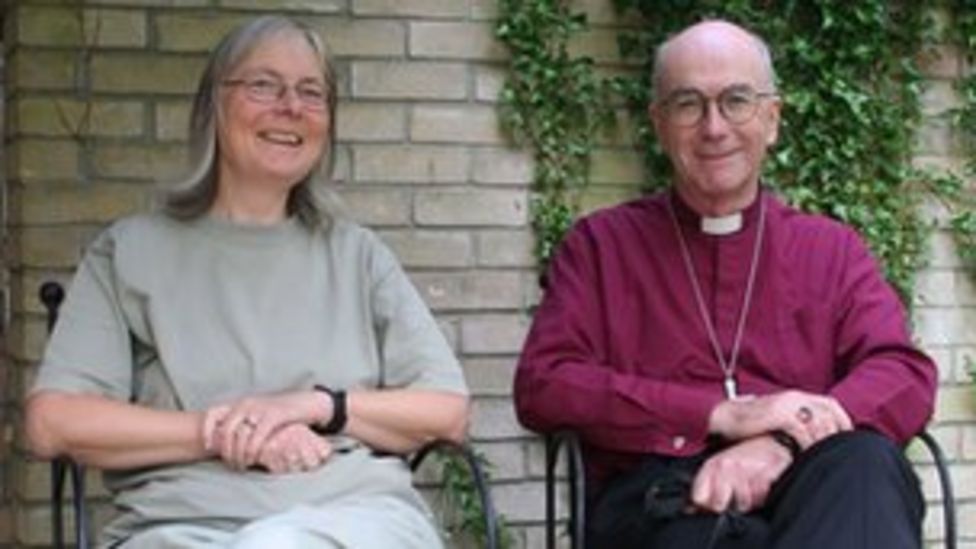A scene from The Canterbury Psalter (12th century)
Blog
Love Incorruptible (2017)

British composer Cecilia McDowall has written a fascinating modern choral anthem whose title comes from the final words of Ephesians (6:24): “Love Incorruptible.”
Actually the anthem takes its entire text from various places in the second half of Ephesians, gathering under the title “love incorruptible” a short series of the book’s ethical exhortations. Here is the anthem’s entire text, to which I’ve added verse references:
Let all bitterness and wrath and anger be put away. [4:31]
Awake! [5:14]
Let not the sun go down upon your wrath. [4:26]
Walk with all lowliness and meekness, with long suffering, forbearing one another in love. [4:2]
Be kind, tender-hearted, one to another, forgiving one another, even as God also in Christ forgave you. [4:32]
Giving thanks always for all things. [5:20]
Speaking, singing, and making melody with your heart. [5:19]
With a love incorruptible [6:24]
It’s only about 70 words long, but it takes the choir nearly five minutes to perform, largely because of the way the lines are repeated. The repetition is artistically crucial, as it lets the texts interact, fugally develop, and mutually interpret each other. The various commands, with their richly interpersonal moral vocabulary, all move steadily toward the title words, left unsung until the climax: “with a love incorruptible” may be the title, but it arrives as a conclusion. Meanwhile, the brief command “Awake!” appears early on, and is repeated powerfully throughout. Along the way it takes on a vast number of tones and maybe a couple of extra syllables. The result is an anthem charged with revelations about what it means to live a live that is morally and relationally awake.
There’s a recorded version of Love Incorruptible on the CD Sacred Choral Music by Trinity College Choir, Cambridge, conducted by Stephen Layton (Hyperion Records, 2021). (I can currently only find one recording of it on YouTube, sung by Trinity Church Wall Street.) Paul Conway’s liner notes to that Hyperion Records track mention that “Love incorruptible was commissioned by Sue Young in memory of her husband, Clive Young (1948-2015), Bishop of Dunwich between 1999 and 2013, and was premiered by the Sine Nomine International Touring Choir at the 2017 Presteigne Festival.”

That’s interesting: Sue Young is apparently the one who selected the texts from Ephesians, and she did so in memory of her husband. (I can’t find the link to the video interview where McDowall discusses this commission, but I recall her saying that Young chose the texts.) What that suggests is that the gathered texts can be viewed in relation to a long marriage, even though the texts themselves are not explicitly about romantic love, lifelong companionship, or marriage –and Ephesians does contain a few verses about marriage which could have been selected! As it stands, “Love Incorruptible” is a kind of digest of Ephesians’ account of the character of a community awake to love incorruptible. Marriage may well be the biographical foundation from which Sue Young worked redactionally –an obituary of Bishop Clive Young mentions his “strong and happy marriage of more than 40 years to Sue, daughter of the indomitable missionary couple Bishop Cyril and Mrs Kathleen Tucker,” which “made theirs a hospitable home, where fun and laughter was never far away.” (Inset: a picture of Sue and Clive from a 2012 BBC story about the bishop’s retirement). But the choral composition says what it says, and sings what it sings.
One thing this composition succeeds in doing is focusing attention meditatively on the remarkable final words of Ephesians. It does so specifically by linking those words backwards to a variety of ethical injunctions from the second half of the book, which is a great way to do it. For a more straightforwardly homiletic and exegetical approach to the same task, see Kevin DeYoung’s notes here.
About This Blog

Fred Sanders is a theologian who tried to specialize in the doctrine of the Trinity, but found that everything in Christian life and thought is connected to the triune God.


